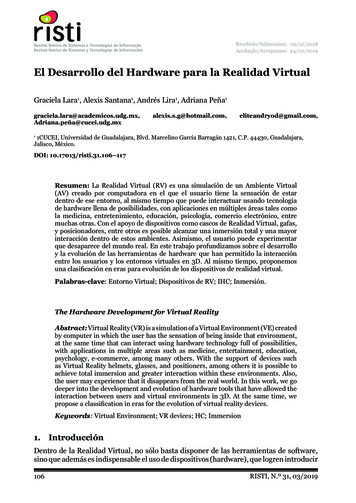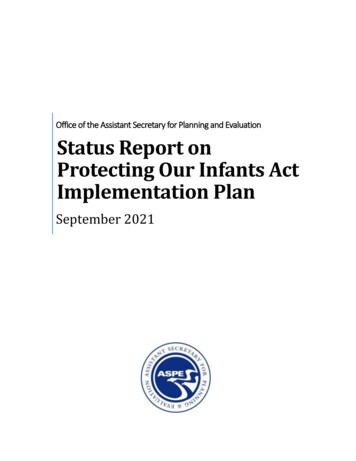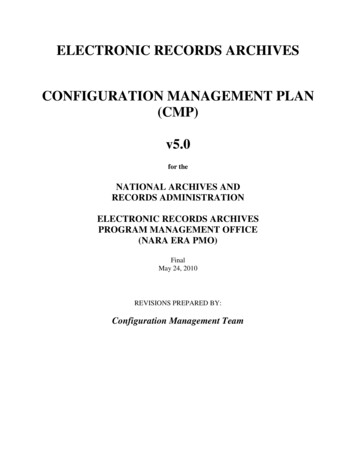
Transcription
February 26, 2019The Honorable Frank Pallone, Jr.Chairman, Committee on Energyand CommerceUnited States House of RepresentativesWashington, DC 20515The Honorable Greg WaldenRanking Member, Committee on Energyand CommerceUnited States House of RepresentativesWashington, DC 20515The Honorable Jan SchakowskyChairman, Subcommittee onConsumer Protection and CommerceUnited States House of RepresentativesWashington, DC 20515The Honorable Cathy McMorris RodgersRanking Member, Subcommittee onConsumer Protection and CommerceUnited States House of RepresentativesWashington, DC 20515RE:Hearing on “Protecting Consumer Data in the Era of Big Data”Dear Chairmen Pallone and Schakowsky and Ranking Members Walden and McMorris Rodgers:The National Retail Federation appreciates your leadership in holding today’s first hearingof the 116th Congress on consumer data privacy issues. Over the past several decades, NRF hasworked closely with its member companies on data privacy statutes and regulations here andabroad. Below we share some principles for U.S. privacy legislation based on the lessons learnedfrom our work over the past three years on the General Data Protection Regulation (GDPR), whichwas adopted by the European Union (EU) in 2016 and took effect in 2018. Our views on federallegislation are also informed by our significant involvement over the past year on the CaliforniaConsumer Privacy Act (CCPA), which was enacted last summer and will take effect in 2020.We view our recent engagements in the GDPR and CCPA as part of a continuum of activityto help the retail industry develop best practices on data privacy and security matters since the late1990s. Since that time, we have worked with members of this Committee and other Congressionalcommittees on data privacy and data security legislation, and we look forward to continuing ourimportant collaboration with you and other interested members of Congress to help develop federalprivacy legislation that the retail industry could support.NRF is the world’s largest retail trade association. Based in Washington, D.C., NRFrepresents discount and department stores, home goods and specialty stores, Main Street merchants,grocers, wholesalers, chain restaurants and internet retailers from the United States and more than45 countries. Retail is the nation’s largest private-sector employer, supporting one in four U.S. jobs— 42 million working Americans. Contributing 2.6 trillion to annual GDP, retail is a dailybarometer for the nation’s economy.
National Retail FederationFebruary 26, 2019Page 2Retailers’ Use of Customer Data and Interests in Protecting Consumer PrivacyProtecting consumer privacy is one of retailers’ highest priorities. Retailers know thatestablishing long-term relationships with their customers requires more than just providing themerchandise they want at the prices they are willing to pay. Successful retailers win theircustomers’ trust and provide a satisfying shopping experience so that consumers continue to shopwith them time and again. A critical element of establishing that trusted relationship lies in howretailers act as reliable stewards of the information their customers share with them when shopping.Retailers have a long history of nurturing customer relationships and meeting consumerexpectations for high quality service. Whether offering goods online or in store, retailers usecustomer data to provide personalized experiences that consumers value. Customers, in turn, expectretailers to process their personal data responsibly and seamlessly when they are shopping. To meetthese high customer expectations, retailers invest heavily in technology and spend years developingappropriate methods to comply with state, federal and global data protection regulations in waysthat further their customer relationships and does not frustrate them.In short, retailers use consumer data for the principal purpose of serving theircustomers as they wish to be served; retailers’ data use is not an end in itself but merely ameans to achieving the goal of improved customer service. This practice differentiates retailers’principal use of customer data from other businesses – typically service providers, data brokers andother third parties unknown to the consumer – whose principal business is to monetize consumerdata by collecting, processing and selling it to other parties as a business-to-business service. Suchdata practices are the profit center of the “Big Data” industries whose products are the consumersthemselves (and not goods sold to consumers). As members of the Committee consider federalprivacy legislation, it is important to recognize the fundamental differences in consumer datausage between two categories of businesses: “first-party” businesses, which sell goods or services directly to consumers and use theirdata to facilitate sales, provide personalization, recommendations and customer service; and “third-party” businesses, which process and traffic in consumers’ personal data, very oftenwithout their knowledge of who is handling their personal data and for what purpose.Federal Trade Commission Views on First-Party vs. Third-Party Data UsesIn 2009, the Federal Trade Commission explained in its staff report on online behavioraladvertising the distinct differences they found between first-party and third-party uses of data,particularly regarding consumers’ reasonable expectations, their understanding of why they mayreceive certain advertising, and their ability to register concerns with, or avoid, the practice, asfollows:For example, under the “first party” model, a consumer visiting an online retailer’swebsite may receive a recommendation for a product based upon the consumer’s priorpurchases or browsing activities at that site (e.g., “based on your interest in travel,you might enjoy the following books”). In such case, the tracking of the consumer’sonline activities in order to deliver a recommendation or advertisement tailored to theconsumer’s inferred interests involves a single website where the consumer haspreviously purchased or looked at items. Staff believes that, given the direct
National Retail FederationFebruary 26, 2019Page 3relationship between the consumer and the website, the consumer is likely tounderstand why he has received the targeted recommendation or advertisement andindeed may expect it. The direct relationship also puts the consumer in a betterposition to raise any concerns he has about the collection and use of his data, exerciseany choices offered by the website, or avoid the practice altogether by taking hisbusiness elsewhere. By contrast, when behavioral advertising involves the sharing ofdata with ad networks or other third parties, the consumer may not understand why hehas received ads from unknown marketers based on his activities at an assortment ofpreviously visited websites. Moreover, he may not know whom to contact to registerhis concerns or how to avoid the practice.1Consumer Concerns with Significant Privacy Violations by Third-Party BusinessesOver the past eighteen months, tens of millions of Americans learned of the significant risksof harm they personally face from irresponsible data practices by third-party businesses who areunknown to them. Members of the committee need to look no further than the recent newspaperheadlines with breaking news – often on the front pages of their district’s local newspaper or thenationwide newspapers – to know which privacy violations Americans care most about:o AT&T selling their mobile phone subscribers’ precise GPS location data,without sufficient notice or consent, to data brokers, who in turn sold theprecise GPS data to “bounty hunters” that used it to surveil mobile locations ofindividuals – not just once, but tens of thousands of times;o Cambridge Analytica using data collected on 87 million Facebook users toconduct psychographic analyses of them based on their Facebook content andselling their findings to political clients, without the consent of 99.6% of them(as 270,000 Facebook users had consented to data collection for academic use onlywithout also being told their consent would provide access to data on all of the otherindividuals in their social network who never consented); ando Equifax mishandling its data breach affecting over 145 million Americans, mostof whom had never heard of Equifax or knew that the credit bureau held theirmost sensitive personal data before its unauthorized disclosure in a breach incident.In the three examples above, third-party data brokers, processors and service providersviolated the privacy of American consumers who cared deeply about these incidents. This is why itis so highly objectionable that leading state privacy laws, such the CCPA, and Washington state’sprivacy legislation, are being crafted on the inaccurate presumption that consumers’ interest in dataprivacy stops at the front door of a consumer-facing business. These laws fail to recognize thatconsumers are equally or even more concerned with what third parties do with their sensitiveinformation behind the scenes. We do not believe legislators voting for these state privacy bills areaware of the serious deficiencies in them, and that businesses abhorred by consumers for recentFTC Staff Report: Self-Regulatory Principles for Online Behavioral Advertising (February 2009), pp. 26-27,available at: g/p085400behavadreport.pdf1
National Retail FederationFebruary 26, 2019Page 4privacy violations qualify as service providers, processors or third parties exempt from any privacyobligations (or even requirements to notify consumers of their own breaches) under the bills thatstate lawmakers sponsor and vote to enact. We urge this Committee to examine these flaws in stateprivacy laws and improve upon them by holding accountable all entities handling consumer data.Principles for Federal Data Privacy LegislationNRF began working with our retail company members on best practices to protect customerprivacy in the late 1990s, with initial efforts focused on developing principles that promotedtransparency and customer choice. Over the two decades since, NRF has participated in efforts byseveral Congressional committees in the House and Senate to develop federal data privacylegislation. This past fall, NRF submitted comments to the National Telecommunications andInformation Administration (NTIA) on high-level goals for federal legislation, a copy of which isattached for your review. Over the years, we have also submitted comments to the Federal TradeCommission (FTC) on a range of data protection issues as the FTC explored the contours of theCommission’s authority, under Section 5 of the FTC Act, to protect consumers’ data privacy andensure that businesses handling consumer data employed reasonable data security practices.American businesses today cannot solely concentrate on federal and state data privacyregulations. Conceivably, a data regulation adopted halfway around the world may impact a U.S.business operating entirely within our national borders and employing only American workers.Retailers are not immune to the significant challenges described by global tech companies toreconcile newly adopted and conflicting data privacy laws – from the EU’s GDPR to California’sCCPA. They are also acutely aware of the potential for 50 different U.S. states and untold foreigngovernments to propose new data regulations each year that have a global reach (like the nature ofthe data each law intends to regulate).These proposed regulations, even if well-meaning, may ultimately make it impossible forbusinesses to use data as they should to serve their customers in the many ways consumers havecome to expect, largely because of the risks companies could face in the form of significantgovernment fines or business litigation if they misjudge how best to use data responsibly to servetheir customers. In the end, it may be consumers who stand to lose the most if businesses cease totake advantage of technological innovations to better serve them out of fear of tripping over ahodge-podge of potentially conflicting state, national and multi-national regulations that includevery high fines for any non-compliance (and some without the ability to cure minor violations).Retailers would like to avert a global data regulation train wreck and support a U.S. federalsolution to data privacy that would apply nationwide requirements uniformly across all industrysectors handling similar customer information. As the Committee reviews proposals, we wouldurge you to adopt several key principles that we believe are essential to federal legislation in thisarea of the law: Nationwide Data Privacy Regulation: Congress should create a sensible, uniform andfederal framework for data privacy regulation that benefits consumers and businessesalike by ensuring that all sensitive consumer information is protected in a consistentmanner regardless of the state in which a consumer resides. Preempting related statelaws is necessary to achieve this important, national public policy goal. Without
National Retail FederationFebruary 26, 2019Page 5effective preemption of state law, Congress would simply add another data privacyregulation to what may eventually become a 50-state regulatory regime, where the U.S.laws fall within a larger, unworkable global regulatory gauntlet for businesses as state,national and multi-national laws all potentially conflict. Congress’s effort to bringsensibility and certainty to data regulation is as important to the future of e-commerce asmaritime law was to trans-oceanic commerce centuries ago. Comprehensive Application of Equivalent Privacy Regulations to All Entities:Federal data privacy legislation should apply to all industry sectors that handle the sameor similar consumer data, and Congress should not craft rules that are specific to anysubset of industry or permit exemptions that pick winners and losers among competitiveindustry sectors. Some industry sectors cite federal laws from last century as the basisfor exemptions from a new privacy law, while not supporting amendments that wouldbring those laws up to present-day standards for consumer privacy protection. To protectconsumers comprehensively, however, a federal data privacy law must apply equivalentrequirements to all industry sectors handling similar sensitive personal information. Transparency and Consumer Choice: Federal legislation should promote wellunderstood fair information practice principles, such as transparency and consumerchoice, with respect to sensitive customer data. Businesses handling such data should betransparent about their collection and use of sensitive data and should provide consumerswith meaningful choices in how such data is used. Retailers support principles like theGDPR’s “legitimate interest” concept as a lawful basis for processing sensitive customerdata, which properly aligns consumer expectations with business needs by balancing abusiness’s legitimate interest in processing personal information to serve its customerswith the customer’s interest in protecting her data from misuse. The legitimate interestbasis provides the regulatory flexibility necessary to ensure that businesses can useconsumer data responsibly in ways that avoid frustrating the customer experience withincessant requests for affirmative consent where it is unnecessary for lawful processing.We have come to these conclusions on which principles are critical to a U.S. federal dataprivacy law through our continuous work with member companies on both the GDPR and CCPA.There are certainly lessons to be learned from each of these laws: some areas of enlightenedthinking that we support, such as the GDPR’s legitimate interest basis for processing customer data,as well as areas of concern that we hope members of Congress will address as they find alternativemethods to achieve the public policy ends of a federal data privacy law. We address several aspectsof the GDPR and CCPA below to inform members of retailers’ views on each law as the Committeeconsiders the testimony of other stakeholders offered at today’s hearing.Lessons Learned from the GDPRWith the GDPR taking full effect less than one year ago, there are still many questions thatremain about how the regulation applies to critical areas of retail business operations, such as: usingcustomer data for improved service or promotional opportunities, managing customer informationdatabases and loyalty programs, collecting customer consents, and honoring customer rights toerase data, port data to another business, or access their personal data held by a business.
National Retail FederationFebruary 26, 2019Page 6A business does not have to be a large multi-national company to feel the regulatory impactof the GDPR. Retailers operating in the U.S. with websites, mobile apps and other digital platformsserving consumers with Internet access may face new compliance standards, increased liability forviolations and more stringent enforcement. While the GDPR is aimed primarily at EU-basedbusinesses, it also applies to companies headquartered anywhere in the world that have stores inEurope or simply target sales to Europeans through the Internet, mobile apps or other remotecommerce channels. The GDPR therefore has significant implications for many U.S. retailers.Following adoption of the GDPR nearly three years ago, NRF engaged our retail companymembers and those of a counterpart EU-based retail trade association, EuroCommerce, in a multiyear transatlantic effort to develop the first common global retail approach to compliance with theGDPR. This collaborative work within the U.S. and European retail sectors culminated in theGDPR Discussion Document for the Global Retail Industry. NRF and EuroCommerce released thisdiscussion document last year and shared it with the data protection authorities (DPAs) in each ofthe current twenty-eight member nations of the EU, as well as with key EU officials in Brussels.Although our principal purpose in developing this GDPR white paper was to provide thebasis for an on-going dialogue between the global retail industry and relevant stakeholders thatwould facilitate retail-specific approaches to GDPR compliance and enforcement, we believe thisdocument has considerable importance for members of the Committee as you examine lessonslearned from the GDPR. In developing their compliance programs to meet the GDPR’srequirements, retailers have discovered several elements of the GDPR that raise similar concerns.The GDPR discussion document takes great strides to illuminate specific areas where retailers’efforts to meet consumer expectations may be frustrated by the GDPR’s approach to data regulationif DPAs’ interpretations of the GDPR’s provisions in the retail context are not carefully drawn.The discussion document identified six critical areas of the GDPR that are highly relevant tothe Committee’s examination today, specifically: data erasure; data portability; the validity of priorconsents; other legal bases for processing data, like legitimate interest; data breach notification; andautomated decision-making, including profiling. We have found that well-meaning requirements incertain of these GDPR provisions may not align with existing consumer expectations, and we havestrived to develop a retail approach to GDPR compliance to help minimize its unintended effects.We invite you to review this document and its discussion of areas where the intended purpose of theGDPR meets up with the reality of trying to practically implement a comprehensive global dataprivacy regulation in a way that will not upset customers’ expectations with how they like to shopand receive personalized service from their favorite retailers.Lessons Learned from the CCPAIn California, retailers face similar issues with the State’s enacted data privacy law, but theirconcerns have been compounded by the fact that California spent little more than a legislative weektrying to accomplish what took the EU nearly a decade to achieve with the GDPR. Theunderwhelming results and drafting errors throughout the law are glaringly obvious, and businessesacross industry sectors are facing a regulatory regime that, if it takes effect as currently drafted, maycreate greater costs for California consumers than benefits.
National Retail FederationFebruary 26, 2019Page 7One of the more significant concerns we raised with the authors of the CCPA is that thelaw’s anti-discrimination clause could lead to the decline of customer loyalty programs (e.g., “club”discount cards, free merchandise, rewards, coupons, advanced release programs, exclusiveexperiences, etc.) offered by retailers and other businesses to California residents. The CCPA putsextraordinary pressure on these customer-favored programs by creating significant liability forbusinesses that provide rewards or other benefits, such as preferred service or pricing, to customerswho sign up for these programs.Under the CCPA, loyalty programs under which businesses provide preferred service orpricing to customers who opted in over customers who opt out of them are permitted only so long asthe “value” of the personal information to the participating consumer used by the business is met byan equivalent value in discounts or benefits received by them. This is a legal equation fraught withsuch ambiguity that it invites an infinite array of “economic” opinions for state courts to weigh inpotentially protracted, class action litigation. Personal data that may be “priceless” in theconsumers’ eyes would, if its value is defined by the consumer, never equate monetarily to areasonable discount on a product. The potential for litigation over this most basic of retailtransactions could lead some stores to shut down loyalty programs altogether as an untenablebusiness litigation risk if they determine the potential costs of lawsuits outweigh the potentialbenefits to the business from providing better service and discounts to their most loyal customers.The CCPA raises other concerns that retailers will continue to address within the Californialegislature over the next year before the law is expected to take effect. For example, at the 11thhour, on the final day of the California legislature’s 2018 session, the CCPA was amended by“clean-up” legislation to clarify the language of the bill. However, several of the so-calledimprovements were refinements to the exemptions in the bill that permit businesses with highlysensitive customer information to avoid the data privacy requirements that must be borne by otherbusinesses handling the same or even less sensitive information. In some cases, there is nocorresponding federal law that would require the exempted sector from providing equivalentconsumer data privacy protections. The CCPA’s disparate treatment of businesses handlingsensitive consumer data is one reason why Congress should move forward with comprehensivefederal legislation to establish a uniform set of requirements nationwide that applies evenly to allindustry sectors handling similar sensitive personal information.American consumers expect all businesses handling their sensitive information to do soresponsibly, regardless of when and where that data is processed. By developing a data privacy lawthat does not pick regulatory winners and losers with the stroke of a pen before the stroke ofmidnight, Congress can ensure that Americans’ privacy will be protected by federal law regardlessof which business is collecting, transmitting, storing or otherwise processing their sensitive personalinformation.We look forward to working with the Committee to help members understand the deepflaws in the California regulation that hold the potential of significantly impacting e-commerce andexasperating consumers who could lose their preferred programs and benefits that they have cometo expect. Congress would do well to avoid making the quickly-considered and problematic CCPAthe model for federal legislation.
National Retail FederationFebruary 26, 2019Page 8As this Committee considers federal data privacy legislation going forward, we urge you tocontinue to examine the lessons learned from the GDPR and CCPA, and to avoid the flaws in theseand other foreign and state data regulations while preserving the more enlightened elements of theGDPR that would advance the U.S. approach to data privacy protection. We look forward toworking with you and members of the Committee on federal data privacy legislation that willprovide a uniform and fair framework for consumers and businesses alike that respects andpromotes consumer privacy across all industry sectors.Sincerely,David FrenchSenior Vice PresidentGovernment Relationscc:The Honorable Nancy PelosiThe Honorable Kevin McCarthyMembers of the House of RepresentativesCommittee on Energy and CommerceAttachment
RE: Hearing on "Protecting Consumer Data in the Era of Big Data" Dear Chairmen Pallone and Schakowsky and Ranking Members Walden and McMorris Rodgers: The National Retail Federation appreciates your leadership in holding today's first hearing of the 116th Congress on consumer data privacy issues. Over the past several decades, NRF has










